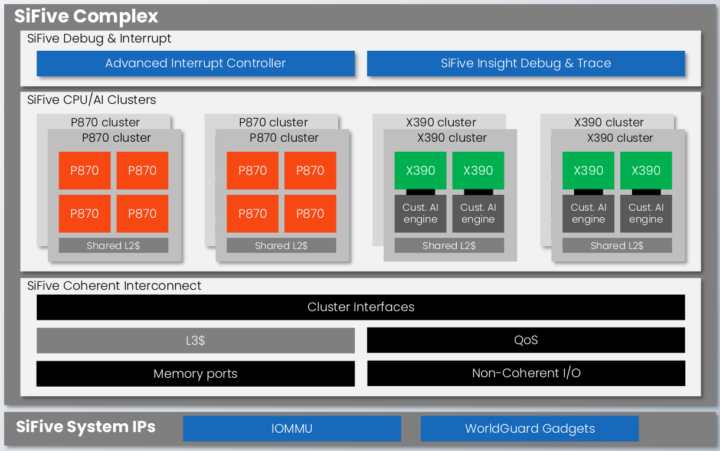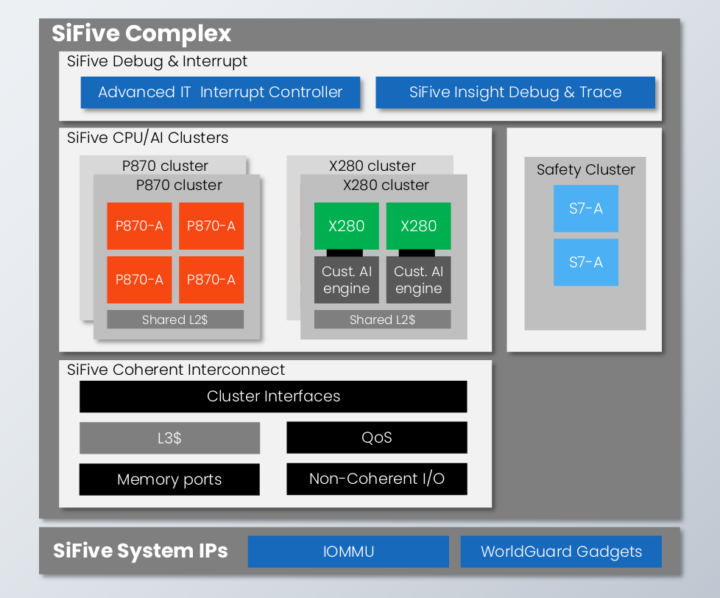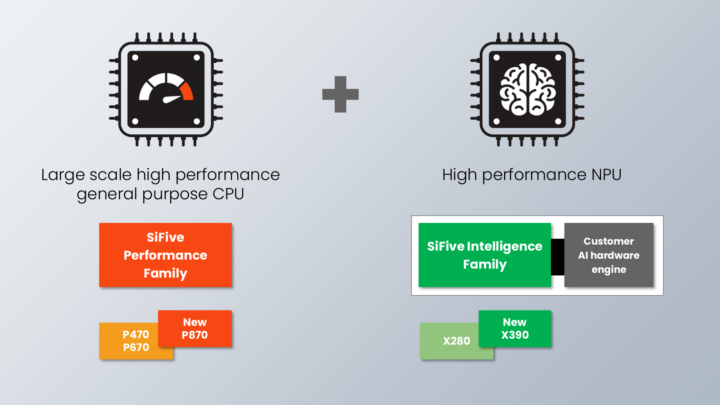SiFive has announced two new high-performance IP blocks with the Intelligence X390 NPU and the Performance P870 RISC-V core that should find their way into SoC designed for Generative AI and ML applications.
We had already covered the Performance P870 and its automotive sibling – the P870-A – from information in an earlier presentation, but the SiFive Intelligence X390 NPU is new to me and appears to be aimed at generative AI in data centers, although we will very soon be seeing companies implement generative AI at the edge in pretty powerful embedded devices.
SiFive Performance P870 highlights:
- Full support for the RVA23 RISC-V profile specification and Vector 1.0 and Vector Crypto
- Six-wide, out-of-order 64-bit core
- Up to a 32-core cluster
- >12 SpecINT2k6/GHz, or a 50% peak single thread performance upgrade over the previous generation SiFive Performance P670
- SiFive Features
- 2x 128b VLEN RVV
- Vector crypto and hypervisor extensions
- IOMMU and AIA
- Non-inclusive L3 cache
- RISC-V WorldGuard security
- P800-Series Architectural Features
The P870 can support Linux and is also “fully compatible with Google’s platform requirements for Android on RISC-V”.
SiFive Intelligence X390 NPU key features:
- Built on the U7-Series core with 64-bit RISC-V ISA, 8-stage dual-issue in-order pipeline
- RISC-V Vector extension supported
- 1024-bit VLEN, 512-bit DLEN
- Single / Dual Vector ALU
- Vector Coprocessor Interface eXtension (VCIX) with 2048-bit out, 1024-bit in for direct connectivity of external hardware accelerator
- 4x improvement to vector computation with its single core configuration, doubled vector length, and dual vector ALUs compared the the Intelligence X280 NPU.
The P870 and X390 will typically be paired in powerful RISC-V SoCs with up to 32 cores and 8 AI accelerator cores (plus the same amount of optional custom accelerators through the VCIX interface) to enable generative AI in data centers as shown in the diagram below.

SiFive promises a full AI solution with optimized libraries, as well as OpenXLA and NN models. The SiFive Performance P870 is also suitable for DPU ( data processing unit), storage and networking, and 5G applications in the infrastructure market.

The company also expected the Performance P870-A RISC-V to be integrated into automotive SoCs alongside the previous generation Intelligence X280 AI accelerator and a safety cluster with SiFive S7-A cores for ASIL B/D compliance. Automotive applications will include standalone ADAS, central compute, and in-vehicle infotainment (IVI).
SiFive also says the P870 and/or X390 may be found in consumer applications such as edge AI security cameras, mobile devices, wearables, and smart TVs, but did not delve into too many details here.
A few more details may be found on the product page and the press release.

Jean-Luc started CNX Software in 2010 as a part-time endeavor, before quitting his job as a software engineering manager, and starting to write daily news, and reviews full time later in 2011.
Support CNX Software! Donate via cryptocurrencies, become a Patron on Patreon, or purchase goods on Amazon or Aliexpress





